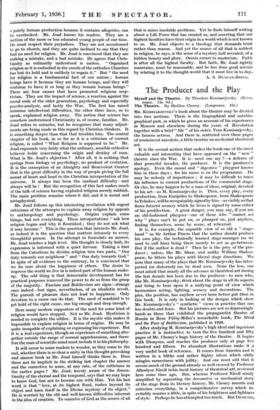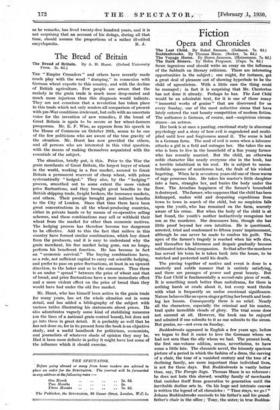The Producer and the Play
Myself and the Theatre. By Theodore Komisarjevsky. (Heine.
mann. 12s. Rd.) The Theatre. By Sheldon Cheney. (Longman. 42s.)
Ma. KOMISARSEVSKY'S book about the theatre may be divided into two sections. There is the biographical and autobio- graphical part, in which he gives an account of his experiences in Moscow and elsewhere during the years of Revolution together with a brief " life " of his sister, Vera Komisarjevsky, the famous actress. And there is, scattered over these pages of reminiscent anecdote, a little treatise on modernist theatrical art.
It is the second section that makes the book one of the most valuable and interesting that have appeared on the " new " theatre since the War. It is—need one say ?—a defence of that powerful invader, the producer. It is the producer's apology. Even the casual and " digestive " playgoer knows him in these days ; for his name is on the programme. He may be nobody of importance ; it may be difficult to trace his influence in current productions of the commercial stage. Or else, he may happen to be a man of ideas, original, devoted to his art—as M. Komisarjevsky is. Then, every play, every production, from Euripides to Shakespeare, from Shakespeare to Tchekov, will be recognizably signed by him—as visibly as that fierce futurist scenery which he loves is signed by some cubist of his predilection. A great danger, you may say, if you are an old-fashioned playgoer—one of those who " cannot see why " plays can't be put on, or plumped on, just anyhow, finding themselves, scene by scene, at rehearsal.
It is, for example, the arguable view of so old a " stage- hand " as Sir Arthur Pinero that the author should produce his own play, the technically learned stage-manager (as we used to call him) being there merely to act as go-between. But if the author is dead ? Then he is the prey of the pro- ducer ; unless, like Mr. Shaw, and unlike William Shakes- peare, he litters his plays with liberal stage directions. We note that many of the plays that Mr. Komisarjevsky has inter- preted (or distorted) are by dead men. None the less, one must admit that nearly all the advance in theatrical art during the last decade has been due to the producer—to men who, like Mr. Komisarjevsky, think about the stage in all its aspects and bring to bear upon it a unifying point of view which harmonizes acting, lighting, scenery and decorations. The plea, the position, has anyhow never been better put than in this book. It is only in looking at the designs which show Mr. Komisarjevsky's " synthetic " views in practice that one has doubts and fears. But his pictures are not so depressingly harsh as those that exhibited the propagandist theatre of Russia in Rene Fillop-Miller's remarkable book, The Mind and the Face of Bolshevism, published in 1928.
After studying M. Komisarjevsky's high ideal and ingenious practice it is instructive to turn the five hundred and fifty pages of Mr. Cheney's huge history of the theatre. It begins with Dionysus, and reaches the producer only at page five hundred and fifteen. Its abundant illustrations make it a very useful book of reference. It comes from America and is written in a blithe and rather flighty idiom which oddly mingles earnestness with jollity. And one must add that it covers much of the ground already so well crossed by Professor Allardyce Nicoll in his lucid history of theatrical art, reviewed here some time ago, But, whereas Professor Nicoll wisely simplified by separating the decorative or mechanical story of the stage from its literary history, Mr. Cheney records and criticizes everything, in a comprehensive survey which in- evitably wearies a little, in spite, of his brightness and lightness of style. Perhaps he has attempted too much. But Dionysus,
as he remarks, has lived twenty-five hundred years, and it is not surprising that an account of his doings, during all that time, should assume the proportions of a rather ill-edited







































 Previous page
Previous page